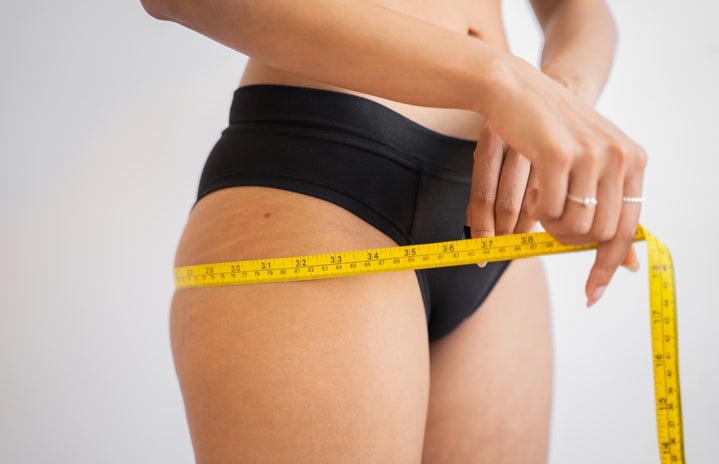TW: Discussions of Body Image, Diet Culture and Eating Disorders
Fad diets, weight loss drugs, low rise jeans and the Victoria’s Secret fashion show – what year is it again? With the resurgence of the good, the bad and the ugly of 2000’s culture comes the question of whether societies obsession with thinness ever really left, and will women ever feel peace in a world that has commodified their own bodies?
Looking around, both online and within the real world, it is obvious that once again the trend cycle has come back around. Low rise jeans are back in shops, the Victoria’s Secret fashion show is making a comeback and influencers such as Alix Earle are modelling Juicy Couture and being compared to the likes of the iconic Paris Hilton. But with it has come the discussion of the toxicity of diet culture at the time, and whether we are also seeing a resurgence in the ‘skinny obsession’ that hit its peak by the 2010s with a spike in eating disorder diagnoses between 2000 and 2009.
This comeback has been pinpointed, as so many trends before it have, to what Mina Lee refers to as ‘The Kardashian Sphere of Influence’. After being held as the pinnacle of the ‘slim thick’ body type so sought over even throughout the peak of the body positivity era, many people online have recently noted that they believe Kim and Khloe have had their BBL’s reduced. A claim neither confirmed or denied, it was directly followed by Kim’s announcement that she “lost a total of 21 pounds” in order to fit into Marilyn Monroe’s iconic ‘Happy Birthday’ gown for the Met Gala. From Khloe’s ‘Revenge Body’ tv show to their promotion of ‘Flat Tummy tea’, the Kardashians have unfortunately never been at the true forefront of body positivity and acceptance, and yet their influence on trends is astronomical. In turn, this recent obsession with weight loss from this influential family has made many wonder whether the current resurgence of all things y2k has in turn resulted in the resurrection of a dangerous obsession with thinness.
Since the 90’s, the fashion industry has changed drastically, with social media allowing for people to have more control over the fashion content they consume as opposed to relying solely on magazines. However, this freedom has resulted in a wealth of unhealthy content that for many has been detrimental to their health. It’s been widely discussed that eating disorder communities on sites such as Tumblr had a devastating effect on the health of many young people throughout the 2010’s and allowed for the creation of aesthetics that championed thigh gaps and visible collarbones, harking back to the ‘heroin chic’ imagery of the 90s. The idea of ‘heroin chic’ was rooted in fashion photography that depicted eerily thin models in dingy environments, perfectly encapsulated by Kate Moss’s “nothing tastes as good as skinny feels”. And whilst Kate Moss has since retracted that statement entirely, stating that not only does she regret saying it in a 2009 interview but that “she welcomes how diverse the current modelling industry is in comparison to when she was at top”, it seems societies obsession with thinness never really left.
This can be seen further in a recent trend of people using the drug Ozempic, and its sister brands Wegovy and Rybelsus, in order to lose weight. Once again harking back to the influence of the Kardashians, many have speculated that this drug aided Kim and Khloe in their weight loss journeys. Andy Cohen joked about celebrities “showing up 25 pounds lighter” all of a sudden, asking “What happens when they stop taking #Ozempic” and The Guardian reported that “a number of musicians and actors had told them they ‘personally’ knew high-profile people using it.” The popularity of this trend “is evident across Reddit forums and Tiktok feeds, where on the latter #Ozempic has 589 million views”, and debate is at an all-time high online regarding not only the side effects of long term use of the drug but also the effects of its popularity on those who actually need the drug for medical reasons no longer having as easy access to it now it’s become a ‘fad diet’.
Lastly, recent trends online have shown a likeness to the behaviour of those online during the dark days of the Tumblr era, with many stating the introduction of TikTok’s slideshow feature has resulted in many using the platform in a particularly similar way. Though seemingly only a small development in what is a much larger cultural issue, the growth of ED communities within these spaces is a worrying sign of a much larger problem and can be extremely damaging to a whole new generation of social media users.
However, due to the widespread nature of the body positivity movement that sprouted in the 2010’s, many believe that this recall to y2k fashion is less of a resurgence of the culture as a whole and more of a reimagining, with a much more body positive outlook on the aesthetic as a whole. Many of those now championing iconic pieces from the Mcbling era grew up watching Disney channel shows filled with overlayered outfits and magazines full of baby tees and low waist jeans, and the turn to the trends is nothing more than a comforting nostalgia than a turn to the diet culture that overshadowed it all.
Unfortunately, at the end of the day, for many the skinny obsession never left, it has always been there in some format, whether that be online or in the world around you, it’s upsetting to see that women’s bodies are once again nothing more than a trend. However, the power of social media over our own self-image can also be used in the fight against this unhealthy mindset, and we have more control now more than ever to curate the content we see across all platforms, and as Lizzie Sheridan tells Vice that she has found seeking out content on tiktok that shows “love for bodies of all shapes and sizes has helped her to begin to overcome her hate for her body. The algorithm gives me videos about how diet culture has made us think badly about food. This, she says, has helped her to build a more positive relationship with food and eating”
Furthermore, this awareness of the toxicity of the culture of turning women’s bodies into endless unhealthy trends can be responded to in a more outwardly political response, states Ione Gamble, editor-in-chief of Polyester Zine.


